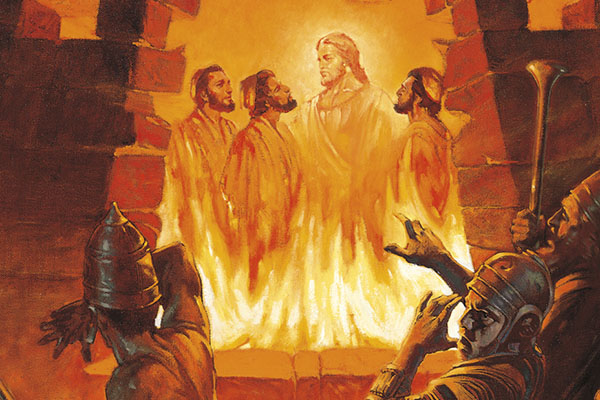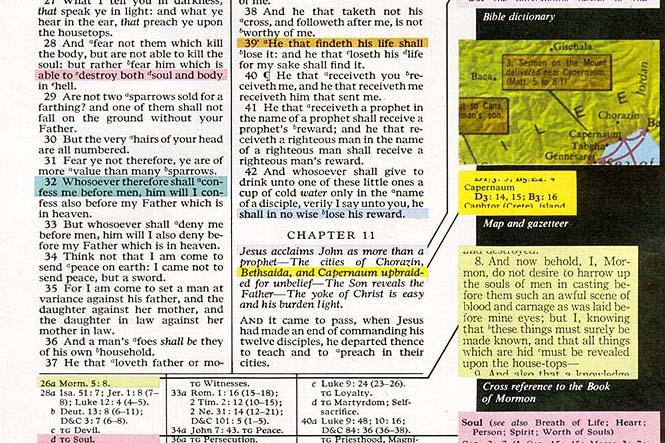
The following article is adapted from a chapter in my new book “How Much Do You Want It?” where I talk about how to develop a strong testimony. This chapter teaches you how to start a scripture study routine that you will actually do day after day.
I once asked a trainer, “What’s the best cardio exercise for me to do?” I figured he’d say something about running or maybe swimming, both of which burn tons of calories.
His answer was both simple and profound: “Whichever one you’ll do.”
“Huh?”
“What do you like doing? That’s what you should do. Because then you’ll actually do it.”
How wasn’t as important as the likelihood that it would take consistently.
The same applies for scripture study. The best way to study our scriptures is whatever way we’ll actually do it!
How do we do it so that we’ll actually do it? Here are just a handful of study methods I’ve used over the years. Maybe something here will inspire you to try or tweak a plan of your own.
1. Chew on Little Bites

Scripture study isn’t a race. We don’t have to sprint through the books, devouring the pages, to make it worthwhile. That can start to feel like drudgery and kill the desire to continue, yet reading straight through is often our default setting way of “studying” the scriptures.
Sometimes, just dissecting a verse or two can yield a lot of food for thought. Even familiar verses can take on new meaning if we break them down into little pieces and consider the significance of each word or phrase.
2. Look for Applications

Nephi taught us that we should “liken all scripture unto us, that it might be for our profit and learning” (1 Nephi 19:23). As we’re reading, we can ask the key question, “So what? What does this have to do with me and my situation?”
If we come at our scripture study time with a question or general dilemma, we’ll find analogies or even direct answers all over the place in the words of the prophets. Think those war chapters in Alma are boring? Think again—they sound like the stuff happening around us today!
3. Do Character Studies

Although the people mentioned in the scriptures are not fictional characters, we can use some things we learned back in literature class. The “characters” have a lot of traits that give us both good and bad examples to follow.
As we read, we can ask, “Who is speaking? To whom is he speaking? What can I learn about this person? What are his motivations? Am I anything like him? How can I follow the good examples I see?”
For example, studying Jonah (the whale guy), we can learn about why we sometimes run away from the things the Lord wants us to do, or how we might even resent miracles! If we look beyond the surface of “war chapter” characters like Captain Moroni and Amalikiah, we find more to learn than we realized.
Looking at these people as real people makes their experiences more real. That sounds like a “duh” (and it is), but it sure makes their stories feel more relevant to our own lives.
4. Enjoy the Language

Although it sometimes feels like the scriptures might as well still be written in Greek, Latin or Hebrew for how difficult they are to understand, other parts are really beautiful and clear. Those are often the verses that get made into hymns and other songs.
We can search out some of those passages by looking at the bottom of each song in the hymnal for the references used. I once made it a project of my personal study to read the lyrics to all the hymns and look up the verses that went with them. It was a glorious experience filled with the Spirit, and I found many hidden treasures of wisdom and beautiful language.
The eloquence and truth in these passages have the power to lift our heart and mind.
5. Compare and Contrast

There are a couple of ways this can be done. One is to compare parallel passages between the Bible and the Book of Mormon or the Pearl of Great Price. This often makes it easier to understand events, because things are worded just differently enough to make the meaning clearer.
Another kind of comparison is to look at how different prophets or groups of people handled similar situations.
For example, why are Shadrach, Mesach and Abednego spared a fiery death when Abinadi is not? Why do the Anti-Nephi-Lehites opt to lay down their weapons of war forever, even at the risk of death, when so many other groups fight to protect their families and freedoms?
Studying and pondering these kinds of comparisons can really help us figure out which gospel heroes speak to our hearts, which spiritual priorities matter most to us, and how the Lord can work miracles in a variety of seemingly opposite ways.
6. Use Study Helps

The Church of Jesus Christ of Latter-day Saints has created all kinds of resources for understanding the scriptures, and all of them point us towards pure doctrine without speculation.
That means it isn’t just some guy guessing about why something is the way it is, or what it might mean. They are based on revelation and can be everything from church websites to audio versions of the scriptures, or from Preach My Gospel and the Personal Progress booklet to the Bible Dictionary and the Topical Guide.
A jaw-droppingly huge collection of Church-approved resources can be found in our pocket or purse by using the free Gospel Library app.
It even has a way to make “margin notes” and cross reference stuff. My personal favorites include the various Seminary and Institute manuals.
7. Make a Timeline

Most of the Standard Works have not been compiled in strict chronological order. Under “Chronology” in the Bible Dictionary, we discover that the order of books in both the Old and New Testaments looks like someone shuffled a deck of cards at least once. Putting things back in order helps the overarching message make more sense.
For the Book of Mormon, we need to remember that the events of Ether (near the end of the book) happened first, and the records of Mormon and Moroni contain letters from each other. For the Doctrine and Covenants, there is a page that lists the dates that each revelation was received.
One fun study I did once was to go through the entire Standard Works—my whole hard-copy quad—reading the chapter headings only.
It’s pretty fun to say I finished all of Alma or Isaiah in one sitting! That simple exercise gave me a wonderfully refreshing and clarifying journey through the histories and spiritual development of the family of Adam right down to the dawning of the Last Dispensation.
8. Speed Read

Okay, I know I just said a minute ago that reading the scriptures isn’t about speed, but with the Book of Mormon in particular, it can be a pretty enlightening experience.
The cover-to-cover approach is best done quickly because the overall message is more evident. The cycles of pride, downfall, repentance and prosperity are easy to detect.
An average reader can finish the entire Book of Mormon in 20 to 30 hours, allowing two to three minutes per page. We can even use the audio version of the scriptures for this adventure. If we bump into something we really think is cool, we can stop and study it, or mark it some way and come back to it when there’s more time.
9. Keep the Big Picture in Mind

The scriptures were all written by prophets who really understood the Plan of Salvation.
With a visual aid nearby, we can read passages and identify which part of the Plan goes with the different principles and doctrines. We can see how it all fits together, and in so doing, how we fit into the Big Picture.
This study method also really brings to light how important the Book of Mormon really is, because it contains so much more doctrine that clearly delineates the difference between the spirit world and our final heavenly home and what really happens with the Resurrection.
Likewise, the Pearl of Great Price gives us a vital understanding of our pre-mortal existence and the fact that none of what happened in the Creation was by chance.
10. Find the Christ

Of course, if we’re looking at the Big Picture, we’ll discover Who’s at the center of it: Jesus Christ, the Savior. This is ultimately the most important part of our personal study.
We have the Old Testament, the New Testament, and Another Testament of Jesus Christ. But what’s a Testament?
The Bible Dictionary refers readers to “Covenant,” which means that at least part of the answer lies in the spiritual contract we enter into with the Lord through ordinances. Reading the scriptures isn’t an ordinance, but in the pages we discover the “fine print” of our covenants.
We see all the amazing things that the Lord is giving us, and we see our obligations and the ways we could potentially forfeit the blessings we want.
Let me say something obvious that we often forget. It’s okay not to finish a specific study plan. It isn’t quitting. It’s finding a new game plan that works better. Gospel study is an eternal endeavor. Once you do find a plan that works for you, you can begin the process of improving every day.
How have you maintained your gospel study on a regular basis?





